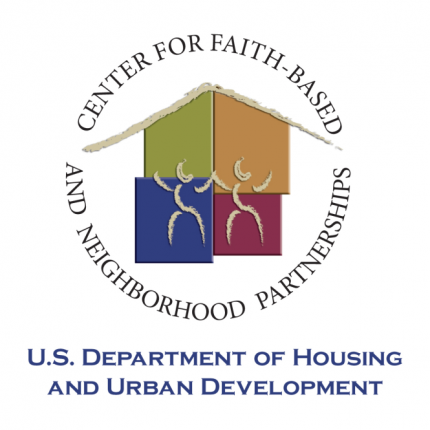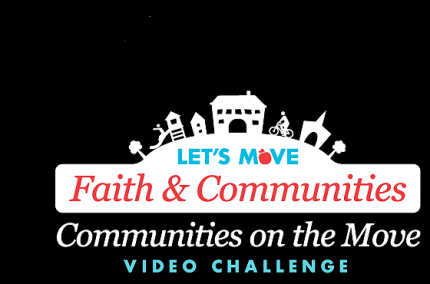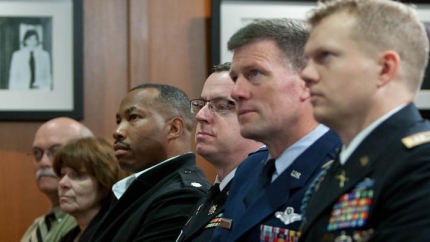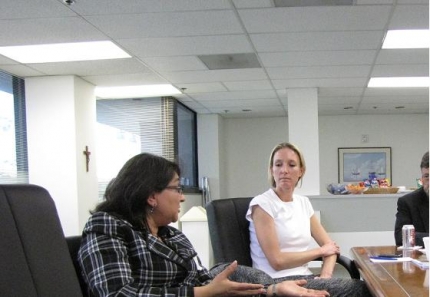Faith-based and Neighborhood Partnerships Blog
Remembering My 5th Birthday
Posted by on May 1, 2012 at 7:11 PM EDTOn my 5th birthday, I was surrounded by the love of my family, and of course, enjoyed a delicious home-made birthday cake made by my mother. Everyone came to celebrate my day, showering me with gifts (I’m told a Barbie play set was involved), to show me how important I was in their lives. While it was a big milestone for me, luckily I was a healthy child, and it was expected that I would reach the age of five. In my first five years of life, I was up to date on my vaccinations, always had access to clean water, and although mosquitoes loved to bite me, my parents did not have to fear that those mosquitoes would infect me with malaria.
For much of the world though, and particularly in Sub-Saharan Africa, mosquitoes pose an ever-present threat to children’s lives, especially in those first five years. In the last year alone, we lost about 7 million children under the age of five, many from malaria.
When I traveled to Ghana in the summer of 2010, I had the misfortune of experiencing malaria firsthand. I met children who were full of joy one day, but lying in bed sick the next- their energy and health devastated by the disease. When I contracted the disease, I understood the extent of their sickness, falling into an extreme fatigue. Thankfully, I had easy access to treatment and recovered quickly, but I know this is not the case for many children and families. I can’t imagine the pain and difficulty so many mothers must experience on a daily basis, unable to provide their children with the life-saving resources needed to prevent and treat malaria.
Learn more aboutUnderstanding the Mortgage Servicing Settlement and the New FHA Streamline Refinance MIP: A HUD National Faith-Based & Neighborhood Partnerships Conference Call
Posted by on May 1, 2012 at 6:56 PM EDTThere is a great deal of information available about the recent Mortgage Servicing Settlement and FHA Streamline Refinance MIP programs. The HUD Center for Faith-Based and Neighborhood Partnerships hosted a national conference call that explained both plans for faith leaders to share with the congregants and communities. The “Understanding the Mortgage Servicing Settlement and New FHA Streamline Refinance MIP” conference call was held April 18th at 2:00 PM EST.
Callers learned about the Mortgage Servicing Settlement Agreement, the new FHA Streamline Refinance MIP options available to eligible homeowners, scam awareness and prevention efforts, and the importance of using HUD-approved Housing Counselors from senior HUD officials including HUD Secretary Shaun Donovan. Faith and community leaders received information and resources useful to congregation and community members facing foreclosure and/or families who might qualify for compensation due to an improper foreclosure practices, mortgage principal reductions and refinancing of underwater homes available for eligible homeowners. The call was well received, with 780 faith-based and community leaders calling-in, and helped educate the community about ways to save their homes, while bringing hope to those facing foreclosure.
Learn more aboutVote for Your Favorite Video Today!
Posted by on May 1, 2012 at 6:16 PM EDTThe public voting period for theCommunities on the MoveVideo Challenge is in full swing! Browse our video gallery and vote for your favorites daily until Friday, May 11th. These videos showcase some of the innovative approaches community and faith-based groups are taking to encouraging healthier lifestyles for kids.
The Video Challenge encourages faith-based and neighborhood organizations to create one-to-three minute videos highlighting their work to make their communities places of wellness. Participants were invited to show how they are promoting healthy eating, physical activity, and access to healthy, affordable food for children. Your vote counts: winners will be invited to visit Washington, DC to share their videos with the First Lady at the White House!
The Challenge is part of Let's Move Faith and Communities, which engages congregations and neighborhood organizations in the effort to end childhood obesity within a generation.
Want to learn more about Let’s Move!and take action? Sign up here and join our movement!
Julie Curti, is the Assistant to the Director for Faith-Based and Neighborhood Partnerships at the United States Department of Agriculture
Learn more aboutMoving Forward on Faith-based and Neighborhood Advisory Council Recommendations
Posted by on April 27, 2012 at 5:39 PM EDTToday the White House is issuing guidance for implementation of President Obama’s Executive Order 13559 setting forth fundamental principles and policymaking criteria for the social service partnerships the government forms with religious and other neighborhood organizations. With this executive order, President Obama adopted many of the recommendations made by his first Advisory Council on Faith-based and Neighborhood Partnerships.
An extremely diverse group of leaders crafted these recommendations, including those representing the Union of Orthodox Jewish Congregations of America, the Religious Action Center of Reform Judaism, the United States Conference of Catholic Bishops, the Human Rights Campaign Foundation, the Baptist Joint Committee for Religious Liberty, the Incarnate Word Foundation, the Interfaith Alliance, the Institutional Religious Freedom Alliance, and Americans United for Separation of Church and State. While there are serious differences among these leaders on some church-state issues, the group was able to unite around a call for certain reforms of the partnerships the government forms with religious and secular nonprofits.
The White House report issued today provides agencies with additional guidance on how to implement these common-ground reforms. For example, pursuant to the Advisory Council's recommendations, the guidance directs agencies to ensure that:
- Standards regarding the relationship between religion and government are monitored and enforced in ways that avoid excessive entanglement between religious bodies and governmental entities;
- Decisions about federal grants are free from political interference or even the appearance of such interference and made on the basis of merit, not on the basis of the religious affiliation of a recipient organization or lack thereof;
- Beneficiaries of federally funded social services may receive services from a nonreligious provider if they object to receiving services from a religious provider;
- Providers are given detailed and practical guidance regarding the principle that any explicitly religious activities they offer must be clearly separated, in time or location, from programs that receive direct federal support; subsidized with purely private funds, and completely voluntary for social service beneficiaries;
- Social service intermediaries that disburse federal funds are instructed about their special obligations, and recipients of subawards are made aware of the church-state standards that apply to their use of federal aid;
- Plans are developed to train government employees and grant recipients on the church-state rules that apply to these partnerships; and
- Regulations, guidance documents, and policies that have implications for faith-based and neighborhood organizations are posted online, along with lists of organizations receiving federal financial assistance.
As chair of the President's first Advisory Council, and a member of the Reform of the Office Taskforce, I would like to thank President Obama for embracing many of our recommendations and for this important step to implement them. The President’s charge to create this detailed report demonstrates his understanding of the fact that these issues require careful consideration as well as his appreciation for freedoms that are cherished by Americans of all faiths and none. As it forms partnerships to serve people in need, the government must respect church-state separation and religious liberty principles. I look forward to continuing to work with the administration and other stakeholders to meet those goals.
Melissa Rogers served as chair of President Obama’s first Advisory Council on Faith-Based and Neighborhood Partnerships. She currently serves as director of the Center for Religion and Public Affairs at Wake Forest University Divinity School.
Creating Vital Partnerships
Posted by on April 25, 2012 at 3:15 PM EDTWhen looking for a group of dedicated individuals that are willing and able to provide assistance in the areas of employment, education, and wellness-- look no further than the Retired Military Officers Association (RMOA). Made up of military veterans who are now executives of successful small businesses, members of this organization are dedicated to serving and supporting veterans and military families.
I had the pleasure of speaking to this organization, informing them of ways to partner with the White-House Office of Faith-Based and Neighborhood Partnerships, its 13 Partnership Centers across government, Joining Forces, and the Corporation for National and Community Service. Members of RMOA were not only eager to learn more about these offices and initiatives, but by the end of our meeting the organization pledged to actively engage with our office.
Several of our Centers are looking to expand their reach with RMOA’s membership and affiliates. The Small Business Administration’s microloan program, the Department of Education’s Together for Tomorrow school improvement initiative, the U.S. Department of Agriculture’s summer feeding program, and the Corporation for National and Community Service’s Corporate Mentoring Challenge are all areas where RMOA can partner with the White-House Office of Faith-Based and Neighborhood Partnerships.
Todos en la Mesa: Making Room for Everyone at the Table
Posted by on April 25, 2012 at 2:59 PM EDTDuring a recent visit to Southern California, I met with key partners in USDA’s efforts to address hunger and make nutritious food affordable and available, particularly in low-income communities.
More than one out of four Latino families in the United States is food insecure, and many do not know that CalFresh, the name for the Supplemental Nutrition Assistance Program (SNAP) in California, can help families put healthy food on the table. Latinos are now the fastest growing demographic group in the United States, and they face higher levels of both hunger and obesity. Since almost half of Los Angeles County’s population is Latino, I was excited to share our new La Mesa Completa Community Leaders Tool Kit with faith leaders from the Catholic and Evangelical communities, as well as with nutrition advocates from Los Angeles and San Bernardino counties.
I participated in the White House Hispanic Community Action Summit, where I met Margarita Fernandez, a member of Patton Alianza Coalition. She reminded me that in spite of the multiple challenges facing Latinos in the United States, there also are great treasures in the community. As a volunteer member of a coalition that focuses on public safety concerns, she shared how nutrition needs in the community was also high on her list of priorities. So, she got her hands dirty – literally! – and decided to start a community garden. She even paid out of pocket to take classes at UC Davis Extension to become a Master Gardener. I was inspired by her commitment to bringing solutions to her community.
Learn more about Service
- &lsaquo previous
- 1
- 2
- 3
- 4
- 5
- 6
- 7
- 8
- 9
- …
- next &rsaquo
White House Blogs
- The White House Blog
- Middle Class Task Force
- Council of Economic Advisers
- Council on Environmental Quality
- Council on Women and Girls
- Office of Intergovernmental Affairs
- Office of Management and Budget
- Office of Public Engagement
- Office of Science & Tech Policy
- Office of Urban Affairs
- Open Government
- Faith and Neighborhood Partnerships
- Social Innovation and Civic Participation
- US Trade Representative
- Office National Drug Control Policy
categories
- Blueprint for an America Built to Last
- Equal Pay
- White House Internships
- Civil Rights
- Defense
- Disabilities
- Economy
- Education
- Energy and Environment
- Ethics
- Family
- Fiscal Responsibility
- Foreign Policy
- Health Care
- Homeland Security
- Immigration
- Inside the White House
- Poverty
- Rural
- Seniors and Social Security
- Service
- Taxes
- Technology
- Urban Policy
- Veterans
- Women
- Additional Issues












